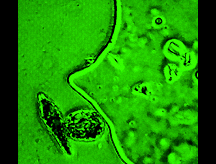 Photo Caption and Credits
Photo Caption and Credits
The course considers cells, the smallest units of life, as autonomous organisms whose function and even survival depends on behavioral strategies. We will examine how cells perceive and react to environmental stimuli such as light, gravity and electric fields. We will also probe how cells detect signals from other cells. Topics include cell-cell communication, cooperative interactions, cell migration, sexual behavior, feeding strategies, aggressive and defensive mechanisms, memory and learning and circadian rhythms. The behavior of cells will be considered in terms of molecular mechanisms, relation to embryonic development and evolutionary significance.
COURSE FORMAT: Discussion Lecture
Level: UG Credit: 1.00
Prerequisites: BIOL203 or BIOL205 or BIOL206
Last Updated on MAR-03-1998
Two euglenas, one-celled creatures, moving around an obstruction
Pfeiffer, John, THE CELL, New York: Time-Life Books, 1972
Copyright Wesleyan University, Middletown, Connecticut, 06459